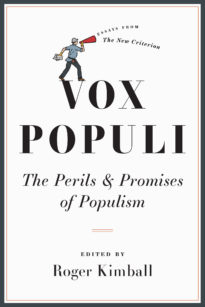In Vox Populi, a new collection that marks the thirty-fifth anniversary of The New Criterion, ten trenchant essays seek to understand the surprising rise of populism around the globe, what role it should play in democracy, and even the semantics of the word itself.
In his essay, recently adapted in the Wall Street Journal, Roger Kimball examines our historical animosity towards the term and asks if our disdain for “the voice of the people” is warranted. Kimball writes:
It is curious how certain words accumulate a nimbus of positive associations, while others, semantically just as innocuous, wind up shrouded in bad feelings. Consider the different careers of the terms “democracy” and “populism.”
To modern ears, “democracy” is a eulogistic word. It produces pleasant vibrations. People feel good about themselves when they use it. “Populism,” just the opposite.
At first blush, this seems odd because the two words occupy adjacent semantic space. “Democracy” means “rule by the demos,” the people. “Populism,” my 1982 American Heritage Dictionary explains, is “a political philosophy directed to the needs of the common people and advancing a more equitable distribution of wealth and power”—that is, just the sorts of things that the people, were they to rule, would seek.
But the term “populism” is ambivalent at best. Sometimes a charismatic figure can survive and even illuminate the label “populist” like a personal halo. Bernie Sanders managed this trick among the eco-conscious, racially sensitive, non-gender-stereotyping, anticapitalist beneficiaries of capitalism who made up his core constituency.
Still, it was always my impression that in this case the term “populist” was less claimed by Mr. Sanders or his followers than bestowed by his rivals and the media in an effort to fix him in the public’s mind as one of the many lamentable examples of not-Hillary. Mrs. Clinton, by contrast, was presumed to be popular though not populist.
There are at least two sides to the negative association under which the term “populist” struggles. On the one hand, some commentators insist that “populist” and “demagogue” are essentially synonyms (though they rarely point out that the Greek demagogos simply meant a popular leader, such as Pericles).
On the other hand is a disdain for the unedified masses, the soil in which populism takes root. Anyone who watched the commentary on Brexit, Donald Trump’s campaign, the early months of his administration, or the recent French election will have noted this.
Taken together, the populist politician is said to forsake reason and moderation so as to stir the dark, chthonic passions of a semiliterate and spiritually unelevated populace. “Populism,” that is to say, is wielded less as a descriptive term than as a delegitimizing one. Successfully charge someone with populist sympathies and you get, free and for nothing, both the imputation of demagoguery and the depreciation of his supporters as, to pick two words, “deplorable” and “irredeemable.”
Read the full essay here.
And learn more in Vox Populi: The Perils & Promises of Populism.
Encounter Books is an activity of Encounter for Culture and Education, a tax-exempt, non-profit corporation dedicated to strengthening the marketplace of ideas.
